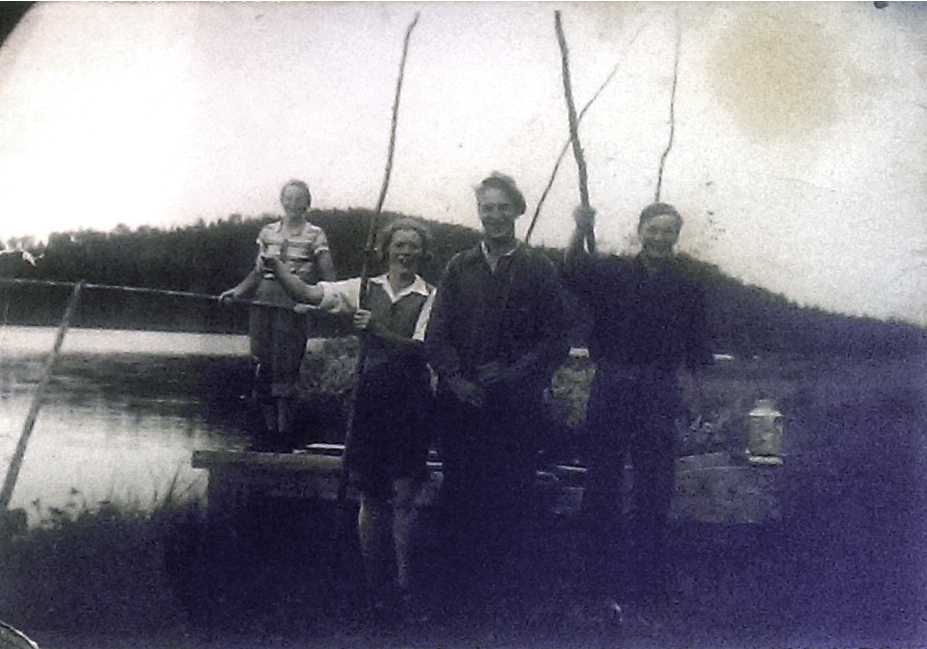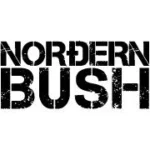Despite being vaguely aware of history and what came before us it is almost impossible to emotionally not feel as if everything has always been more or less the way it is now. As humans we are very much focused, for natural reasons, on the absolute present and it is very difficult to truly understand what came before us. However, we don’t have to go very far back to see how life was very different for a great many people, with the generations that are now disappearing being the last ones truly connected to such a life on a larger scale in the western world. There was still a closeness to nature that in many cases was unavoidable and… natural, given the circumstances they lived in.
In many places most men and women had a fairly comprehensive set of skills that helped them when outdoors and men in particular were expected to be quite capable in such surroundings, while there was less fuss about it all as it was expected and the norm. Just look at the piloting pioneers of the early 20th century competing to be the first to cross the Atlantic. They were fairly certain most of them would crash into the ice-cold water as their aircrafts failed, and yet they basically just put on a thick leather jacket in their open cockpits, while their wives gave them a thermos of coffee and a pack of sandwiches, then crossing the dark and ice cold Atlantic followed by scattered support ships spread out over the ocean to rescue those who went down.
They were of course extreme in their choice of danger, but not so much in feat. My great-grandfather once carried a wooden cabinet on a sled pushing it in winter time from the city of Skellefteå to Sundsvall, a distance of some 400 kilometres, a feat that few would attempt to do today, but which was simply necessary for them back then. Such actions put the feats of some modern and historical adventurers in a bit of a different light, I think. Oftentimes it is more a question of being able to choose to perform an unnecessary feat instead of a necessary one. Everyday chores could be just as extreme and dangerous, but were never spoken of or remembered. The same thing is true for accounts of the lives of various tribes like e.g. the Sami, the indigenous people of far northern Scandinavia, who by today’s standards led harsh and dangerous lives with constant threat of bears and wolves all the way up until modern times.
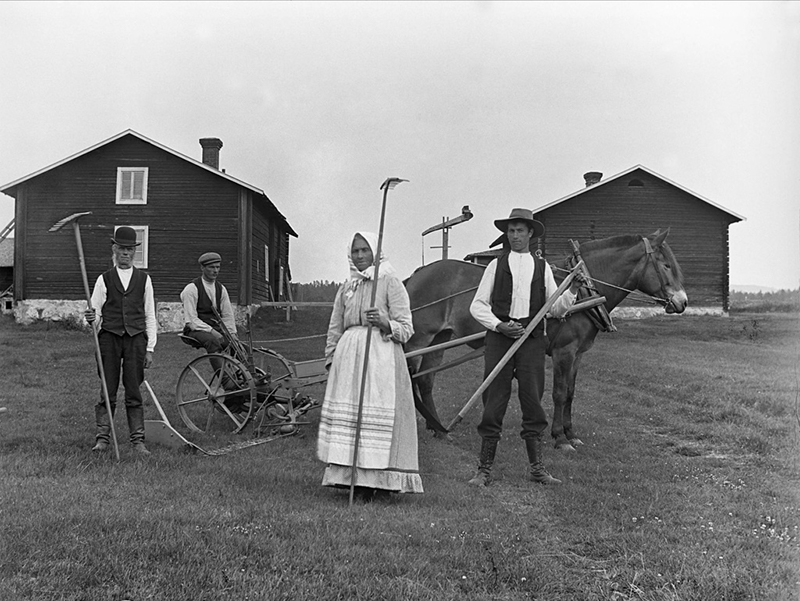
Harvesting in Haverö, Sweden, early 1900s
Death, poverty and hunger were not theoretical concepts, but something everyone was familiar with. Childbirth deaths were very common and butchering of animals was much closer to normal life than the compartmentalized butchering factories we have today. People were very used to what we consider hardships today and most of them they never considered as such, but as normal parts of life. However, people possessed knowledge and skills which kept them reasonable safe for all these types of hardships. There are important things to learn from that.
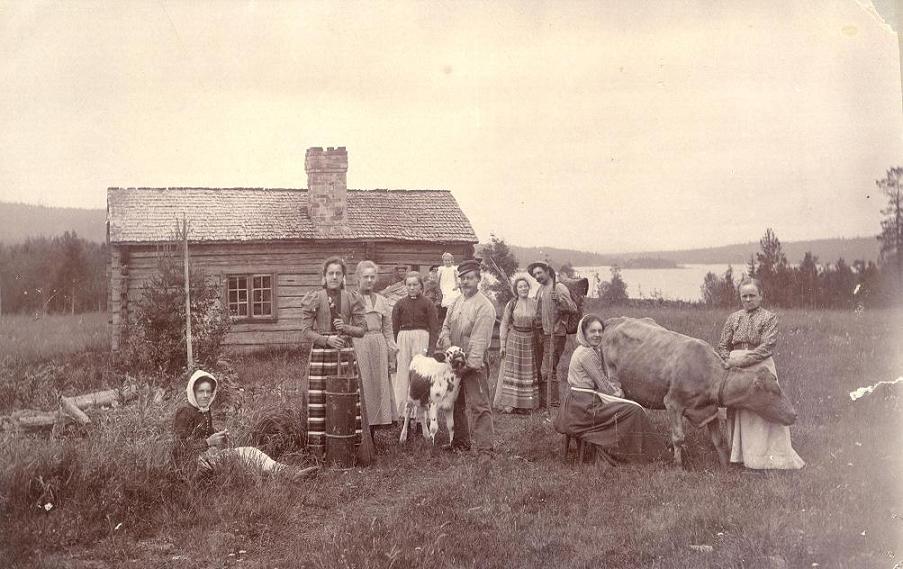
Normal sized cabin for a poor family of a dozen people, in Haverö, Sweden, late 19th cent.
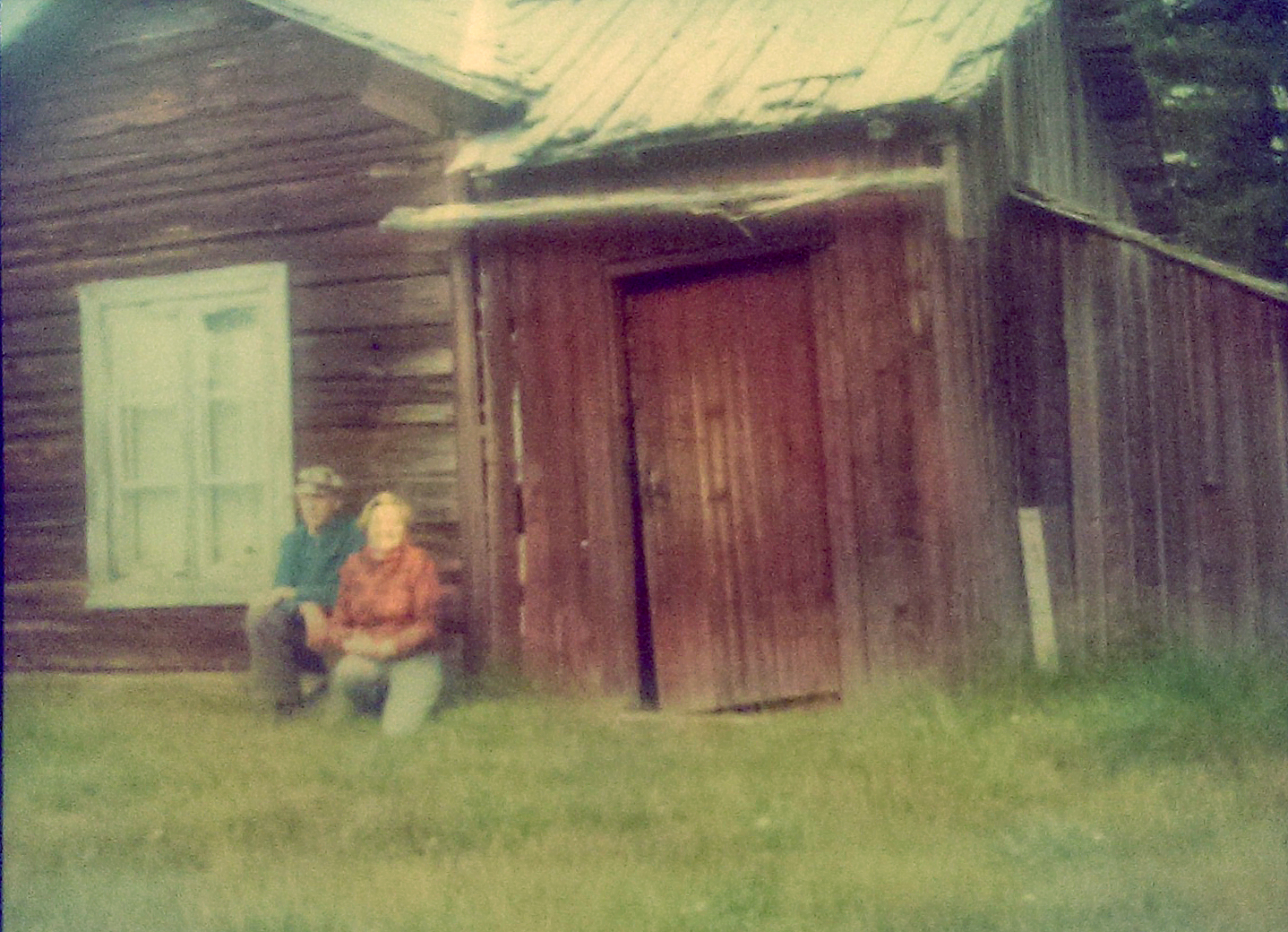
Likely my grandfather’s childhood house
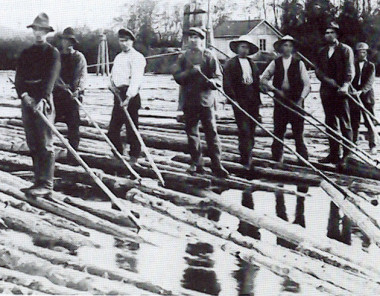
Swedish log drivers
My own grandparents led a fairly simple life in northern Sweden, both coming from small villages, and in particular my grandfather who grew up in Haverö in the 1920s, in a house probably not too dissimilar to the above and the bottom one likely his childhood house. The time was shadowed in Europe by WWI and what would lead up to WWII.
People in northern Sweden were largely very poor and starvation was not uncommon, with most men working in the growing wood industry, either with cutting down trees, transporting them by horse or as river log drivers or carrying planks at the saw mills.
Associated business like charcoal kilning was also important and performed by the poorest of people.
Society was extremely stratified with a handful of rich and thousands and thousands of extremely poor, barely capable of sustaining their families, a situation which would lead to growing socialism and communism in the north, simply out of desperation and brutal exploitation. As late as 1879 the Swedish King Oscar II sent cannon boats aiming them at protesting and starving forest workers, threatening to kill them all unless they ceased their activities. The workers were protesting against the saw mill owners stealing the state compensation which the business had received to alleviate the bad times the whole business was in. However, the sawmill owners didn’t share any of it with the workers and instead, in fact, lowered their wages thus making an increased profit from the suffering. Similar things had happened with grain production a decade earlier, where people were starving at the same time as Sweden exported record amounts of grain to feed the tram horses of London, thus forcing people to emigrate to America or die. Times were to say the least, tough. And about a quarter of the Swedish population emigrated for better opportunities, with Chicago then being the 2nd biggest “Swedish” city, counting number of Swedes living in a single city. Some would later come back with their experiences, forcing early 20th cent American democracy into the then rigid Swedish society, a form of democracy which by today’s American standards would have been regarded as socialism.
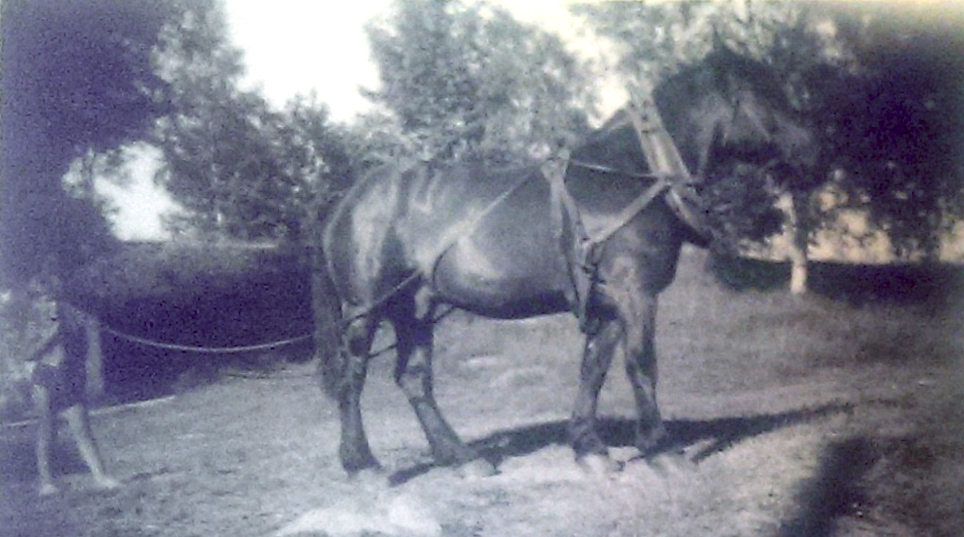
My uncle in the early 50’s with the horse used to plow their field.
Consequently, with this as backdrop for his own grandparents and parents, my grandfather started working in the woods at the age of four, leading horses that pulled tree trunks to the log drivers at the river or to the saw mills. He never went much to school, learning only to read, the Bible and simple maths. And since the family was very poor, children were expected to do what they could to help out with the chores.
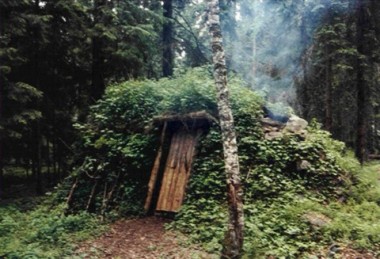
A forest sleeping cabin for charcoal kilners
Later he started working at a charcoal kiln preparing charcoal, while living in the woods and sleeping in a crude cabin with the other kilners. Finally he ended up working at a saw mill carrying planks on his shoulder all day, six days per week, physically broken at young age, but always proudly working with their small crops of land, or out in the woods with his dog. He was never a farmer in any respect, but lived close to nature for much of his life, even if it would come to change to a degree with the growing urbanization starting already in the 50’s.
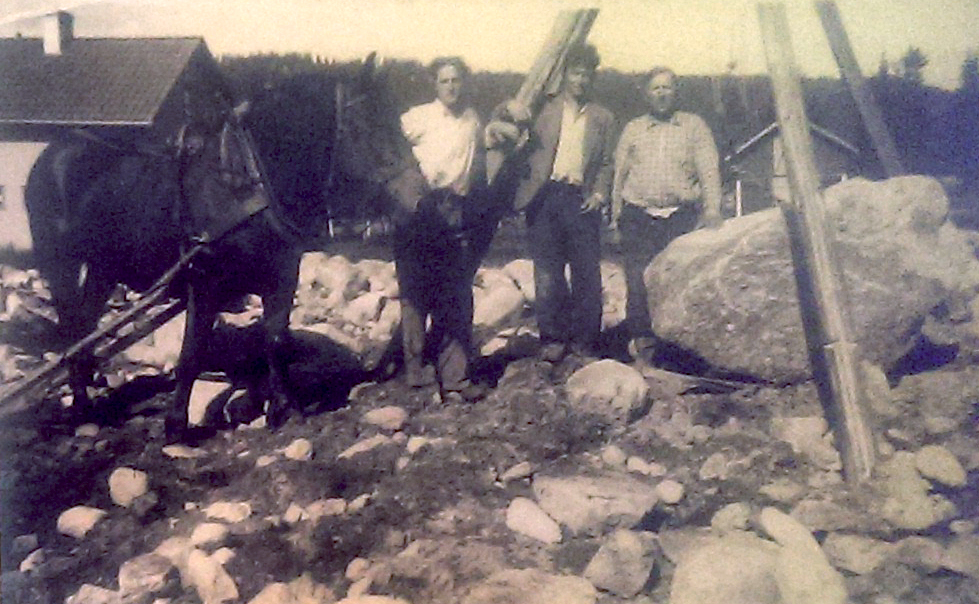
Working to build the foundation for my grandparent’s house, early 40’s
With the help of others he built their own house from the ground up, using a horse to pull stones from their field for the building of the foundation. He plowed their potato field with the help of a large Swedish Forest horse every year, the same type that he had used to pull logs through the woods as a child. He grew potatoes, carrots, radish, rhubarb, raspberries, strawberries, blackcurrant & redcurrant and apples, thus keeping them self-sustained for such things through a lot of the year with my grandmother making her own jam and squash and keeping the vegetables stored in the dark cool basement. I fondly remember stealing strawberries as a child, with them of course looking on through the kitchen window, drinking coffee from the plate and laughing at my attempts at sneaking around the strawberry fields. Afterwards I would join them for a cup of coffee, homemade bisquits and a few poker games.
He never bought a Christmas tree in his whole life, instead just going off into the woods to steal one, carrying it on his century old wooden sled. He considered anything else incredibly stupid.
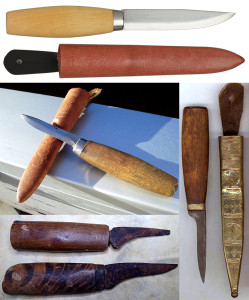
Typical looks of well-used Swedish Mora knives.
He also had his workshed filled with tools that were several generations old already when he got them. He never threw away a crooked nail, instead keeping them in boxes for future uncrooking and use. He came from a tradition where families left even clothes and shoes as inheritance, regularly putting new soles on the shoes and boots for the next generation to wear. Throwing away things that could be fixed was completely unthinkable and tools like axes, mallets and hammers in particular could be several hundreds of years old. Knives were sharpened until it was no longer possible.
I truly consider myself blessed growing up as a child with them so close, being able to experience something which now is largely lost to most of us.
***
However, the notion of the free and beautiful wild is a late, modern and romantic one. For much of European history it represented something completely different; chaos, danger and hardship, if still divine in origin and thus also divinely ordered as contradictory as it may sound. Cities and villages with associated farmland represented the opposite; order, safety and a controlled environment with a far easier life, which of course was not always the practical reality. Travelling outside of the city meant you had to bring protection from the possible and quite real threat of wild beasts and outlaws and either arm up yourself or bring armed guards with you. People who normally weren’t armed in the cities were so outside of them and the laws that controlled their carrying of arms in the cities were more generous outside of the cities. As late as in the 1960s rural mail carriers were commonly still armed with pistols and batons, and before that sabres, for their protection. Of course people still used nature and the forests for its resources, but not so much for recreation apart from the restricted hunting.
For that very reason, the disorder that nature represented, people also had to have some basic skills in order to sustain and protect them while travelling between cities as well as in regular everyday life. Collecting firewood, making fire, finding edible things in nature like plants, nuts, fruits & berries, honey & eggs, knowing some medical plants and knowing how to care for injuries like cuts, broken bones, burns & broken teeth, how to travel and navigate in the woods & lakes in both Winter and Summer time etc. were common skills. Skills that are just as much needed today if you find yourself lost or injured in the wild. Of course knowing how to cultivate land and preparing pelt & wool, fishing & hunting, gutting, butchering, preserving meat, vegetables & seeds, milking & preparing butter, processing grain, how to do carpentry & repairs, making clothing & textiles, how to sharpen knives & axes, rust prevention, and even how to make your own tools were regular household skills well into the 20th century.
Adding to this, Sweden instituted a conscript military force in 1901, as did many other countries. This meant that all men had to do military service for 8 months, with parts of it being learning to live and move outdoors even in harsh wintertime and every sixth year repeat his training for a month until retirement. As time passed it also got more complex, professional and lasting even up to 15 months. This training with time came to be a bit of a test of manhood, a time of quickly growing up, learning to take responsibility and working in a group with little room for excuses or laziness. It was a ritual to pass, a shared experience among all men that joined them together no matter social or financial status. In green everyone was more or less the same and results and attitude was all that mattered. This also gave everyone a core set of skills and knowledge on how to handle themselves in nature, to care for tools and equipment, raise a camp, to skin game and prepare food, handle field hygiene and more.
***
These were skills that were tested and transferred over the generations and which are rapidly disappearing with the last remains of the generations that were still young in the 1940’s and 50’s, and due to increasingly normative urban life and the following generations being more and more disconnected from rural and wilderness life. All of it coming to its extreme with today’s young generations that spend large amounts of time in front of their computer screens, televisions and mobile phones. And with many countries having disbanded the conscript military forces in the last few decades there is little to tie things together the way it used to be.
We live in a consumption society that is built on using and disposing things that are often designed to break within a certain timespan, instead of repairing them. This consumption society is not even 50 years old yet, despite being the norm today and fully accepted by most. Fewer and fewer know how to even cut meat and, as prefabricated crap food is often cheaper than non-processed food, a growing number of people don’t even know how to cook nutritious and healthy food. It is quite clear that such a society can’t be sustained indefinitely and we all know it, with this awareness as a bad conscience we don’t want to recognize.
Still, there is a growing concern regarding the dangers of this, even among the very young, further emphasized by the great many dystopian movies, tv-series, video games and books as well as the reality tv shows of manly men doing crab fishing, gold digging, hunting & game trapping, cutting timber etc. Some people are even preparing for an apocalypse where society breaks down due to whatever reason, bunkering up on food, drinking water, equipment and arms. This is of course extreme, but even the Swedish Civil Defense Association recommends everyone to always keep enough water and food to support themselves for at least three days. And knowing people who have suffered natural disasters like the Katrina hurricane, trusting society to sustain us completely can be dangerous.
So, for a society it is quite dangerous to lose this knowledge and these skills as more and more is tied up to a complete reliance on energy, electricity, oil & oil-based plastics, computers, the Internet & IT and cheap transportation – things we can’t be certain will be reliable in the long run with various threats like e.g. hacking by organized crime, terrorists & military and the inevitable peak oil. Society is quickly growing more and more vulnerable to such threats, while also becoming less and less capable of sustaining itself without these things. There is a growing need not just from individuals seeking their roots in an increasingly rootless society, but also for society itself to encourage the preservation and learning of traditional skills that relate to nature, both the cultivation of and living close to it. And while little action regarding this is coming from the top, there is a growing roots movement that seeks this out, seen among preppers and hipsters alike.
That said, one doesn’t have to go full hermit, building one’s own log house, or learn survivalism to get closer to a more natural life. Just regularly spending time in nature can help a lot, learning from other’s experience. Not only is this fun and interesting, but from it other important values also come. Values like a strong sense of self-confidence that comes from being and feeling competent even in the wild, a confidence in being independent, self-reliant and capable of sustaining oneself. Don’t be naive though and think it will happen overnight, that you can do a Thoreau, going off living off of the land. But bit-by-bit we can all learn to retreat towards a more natural life.
However, independence and self-reliance alone only promotes certain values. Working together with others is just as important as help… helps, be it for gathering of resources, preparing them or just providing company & motivation or even simply sharing of body heat in cold weather. Community has been important for as long as we can remember and sharing and transfering of knowledge and skills is vital for a strong society. And luckily there are a lot of people who are willing to share their experience, thus preserving things that may one day prove more important to us than we would like to think.

